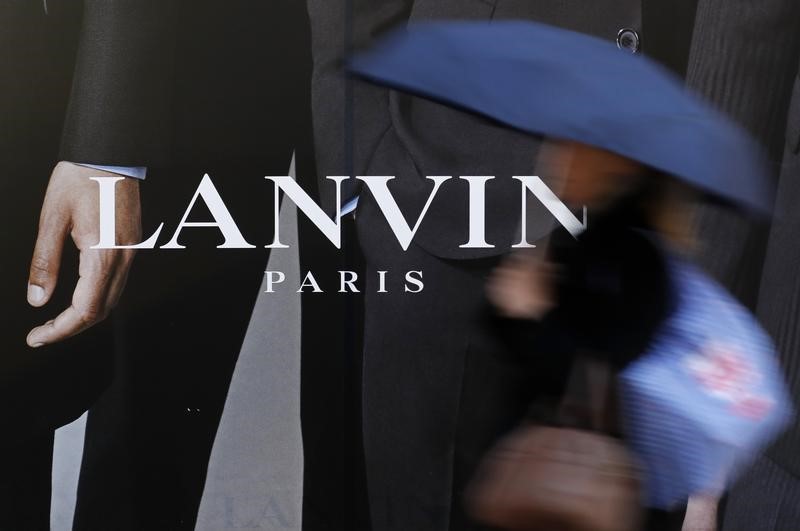 © Reuters. FILE PHOTO – A woman walks past a Lanvin store in Paris
© Reuters. FILE PHOTO – A woman walks past a Lanvin store in ParisBy Pascale Denis
PARIS (Reuters) – Auditors for Lanvin, France’s oldest fashion house, have filed a warning with a commercial court in Paris over financial troubles at the label as it struggles to stem slumping sales, two sources familiar with the company’s performance said.
The privately-owned label, founded in 1889 and long synonymous with Parisian chic, does not publish its earnings. However, the sources said the company’s provisional forecast for the year shows sales will fall 30 percent in 2017 after a 23 percent drop last year.
Under French company law auditors have to inform managers and file court warnings when a firm’s operations risk being compromised by its financial situation.
Lanvin and the auditor did not respond to emailed requests for comment.
Lanvin has had trouble inspiring buyers since it stunned the fashion industry two years ago by firing star designer Alber Elbaz. The label has changed artistic director twice since then.
“The auditor has now alerted the Paris commercial court over the company’s very worrying situation,” one of the sources said.
The sources said Lanvin needed an injection of cash to buy some breathing space or it may not be able to pay employees’ salaries in January.
However, they added that a recapitalization originally discussed for September may yet happen by the end of the year.
The company is majority held by Chinese-born businesswoman Shaw-Lan Wang. It made an 18.3 million euro loss in 2016, sources with knowledge of the situation had previously told Reuters. They forecast that losses were set to deepen to at least 27 million euros in 2017.
STRUGGLING FOR ORDERS
Lanvin’s financial struggles come as rivals including France’s Louis Vuitton, part of LVMH (PA:), and Italy’s Gucci, owned by Kering (PA:), enjoy a sales bounce driven by resurgent demand from China.
New artistic chief Olivier Lapidus – who has designed menswear for Balmain as well as wedding dresses and furniture — has yet to make his mark. Industry analysts acknowledge brand reiventions can take several seasons before translating into an earnings boost.
Lanvin unveiled its latest collection in September. Orders at the showroom, where designs are presented to department store buyers, were down about 50 percent on the previous year, a third source familiar with the matter said.
Lapidus’s collection – a sober array of skimpy mini-dresses, many in black or imprinted with an assortment of letters evoking the Lanvin brand – was put together in 42 days after his appointment in July.
“The buyers are struggling to figure out Lanvin and were thrown by the sudden appearance of the logo on the clothes,” the third source added.
More ostentatious branding has worked well for other labels in recent years, including Christian Dior, although it was traditionally not an approach taken by Lanvin.
Lapidus’s predecessor, Bouchra Jarrar, had brought in a more tailored style – a shift from Elbaz’s more exuberant, frilly designs – that also failed to reignite sales.
Lanvin has been closing unprofitable stores and cutting advertising spending to control costs. Named after founding French “couturiere” Jeanne Lanvin, the label employed some 300 staff at the end of 2016.
Wang, a media magnate based in Taiwan, owns 75 percent of Lanvin, with the remainder held by Swiss businessman Ralph Bartel, who stepped down from the firm’s board in July.
Bartel has previously offered to inject extra capital into the label in exchange for majority control.
Lanvin has shaken up its management in recent months with a series of board changes, including the appointment of Nicolas Druz, who was a close advisor to Wang and has just been appointed deputy managing director.
Source: Investing.com



























